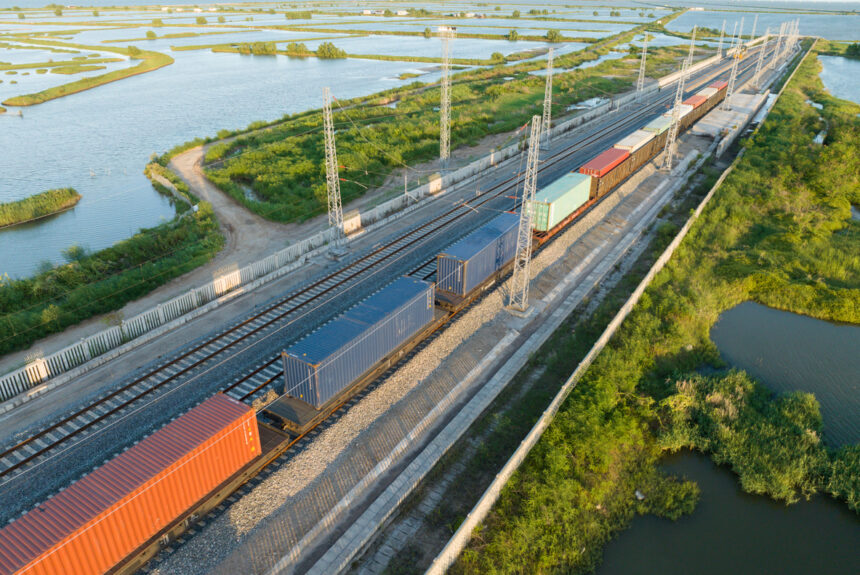The railroad industry plays a pivotal role in the nation’s transportation system by cost-effectively moving goods to customers nationwide. American railroads provide many benefits, such as improved supply chains, reduced traffic jams, and lower fuel consumption compared to other modes of transportation. Moreover, freight rail is responsible for only 1.8 percent of greenhouse gas emissions from U.S. transportation.
>>>READ: California’s Rail Regulation Is Bad Economic and Environmental Policy
Despite railroads’ benefits, regulators in California and other states are looking to disrupt the industry by forcing a costly, rushed green transition. Earlier this year, the California Air Resource Board released a proposed rulemaking that would require the state’s railroad industry to fully adopt zero-emissions technology by 2030. The rule would ban the use of all locomotives that are 23 years or older in the state and impose strict reporting requirements on firms.
Complying with such rules will jack up transportation costs and incentivize firms to substitute for other forms of transportation, such as trucks. With more congestion on the highway, there will be more accidents, invoking higher greenhouse gas emissions. CARB puts individuals’ safety at risk with strict deadlines. Importantly, the rule doesn’t sanction conventional testing and precautions. Allowing the necessary time for research and development is crucial for people’s well-being.
Before CARB can finalize its rule, it must receive a Clean Air Act waiver for the regulation of freight rail locomotives from the EPA. Recently, the House Science, Space, and Technology Committee’s Investigations & Oversight subcommittee held a hearing to discuss CARB’s rule and its implications on America’s supply chains, environment, and economy.
CARB’s timeline is impractical since the available technology isn’t ready to be used commercially. Demanding locomotives to operate under these rules will hurt businesses and consumers. As Rep. Jay Obernolte (R-CA) pointed out in his opening statement:
“CARB’s zealous actions threaten to derail years of progress made by railroads to reduce emissions. Through decades of investments and billions of dollars in research, the rail industry can now move 2,000 pounds of freight 450 miles on a single gallon of diesel. The rail industry continues investing in reducing emissions and other particle contaminants through technologies such as positive train control and trip optimization…Suppose the EPA allows CARB to implement this proposal, and the rail industry cannot meet the impossible demands. In that case, we will likely see a shift in modal transportation where all freight is no longer moved by rail but is instead transported via trucks within the state.”
Although reducing freight rail emissions is laudable, CARB’s time frame to achieve this goal is illogical. The existing zero-emission technology is battery locomotives. Battery locomotives have yet to become capable of producing an adequate amount of power that diesel locomotives supply. Chairman Jay Obernate remarked, “CARB is expecting the rail industry to invent a battery that can hold up to 20 times more energy capacity than currently exists, and then mass produce that technology and include it on every train in the nation within the next six years.”
>>>READ: The World’s First Solar-Powered Truck is Being Tested in Sweden
CARB’s rule would also be detrimental to short-line rail, which are short lines that provide first-mile and last-mile freight rail service. Short-line rail handles one in five national railcars and is tied to nearly 500,000 jobs and $56 billion in economic value. Chuck Baker, the President of the American Short Line and Regional Railroad Association, estimates that CARB’s regulation will cost California’s short line operators somewhere between $335 to $427 million in equipment upgrades. At the same time, 172 locomotives will need to be replaced. Is a small railroad network that covers the first and last miles of freight transport.
While CARB’s rule would only apply to California, it could set a precedent other states could adopt. CARB would force North America’s rail network to spend millions of dollars to comply with the regulation, increasing the cost of transporting goods, which would be passed on to consumers.
Elizabeth Bradish is a rising junior at the University of Maine and Summer Intern at C3 Solutions.
The views and opinions expressed are those of the author’s and do not necessarily reflect the official policy or position of C3.
